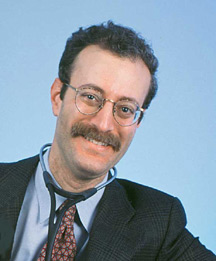How Can We Beat Those Food Cravings? (web article)

Dr Lawrence Cheskin
The statistics about dieting are well known and discouraging: Only about one-third of the patients who lose weight through the program at the Johns Hopkins Weight Management Center manage to keep at least half of it off for more than one year—and those figures reflect what is considered to be a relatively successful outcome in the weight-management field.
Spurred by the fact that food companies everywhere are jumping onto the low-carb bandwagon—even Coca Cola and Pepsi plan to roll out lines of reduced-sugar, low-carb drinks this summer—the Office of Communications and Public Affairs spoke with Lawrence Cheskin, MD, an associate professor with the School’s Center for Human Nutrition, and director of the Hopkins Weight Management Center, about fad diets, food cravings and how to fight the urge to eat more than our bodies need.
Office of Communication and Public Affairs: What about the new diets, like today's low-carb systems, that are constantly coming off the presses? How do you sort them all out?
Lawrence Cheskin: Before signing on with a new diet, try to analyze its claims. Does it make sense from a nutritional or thermodynamic point of view? Does it obey the laws of physics and chemistry? If a diet says you can eat unlimited amounts of calories without gaining weight, then its creators are either lying or misguided. Any extra calories that you eat are going to be stored rather than burned by the body.
C&PA: What would you tell people is a better way to lose weight and keep it off over the long run?
LC: Almost any "diet" will cause weight loss if strictly followed, but choose something that seems sustainable to you because it’s reasonably tasty, nutritionally balanced, and filling. Understanding what triggers overeating for you is also a key to long-term weight control.
C&PA: Can a person become addicted to food, or to sugar?
LC: There are perhaps some similarities with addiction and it's probably OK to say “I'm addicted to sweets” in the vernacular sense, but you have to be careful. Food, even sugar, is not the same as heroin or cocaine, in that with food there usually aren't the physical hallmarks of addiction, such as withdrawal and tolerance.
C&PA: Then how to explain the intensity and urgency of some food cravings?
LC: Well, more important than physical addiction perhaps is how we've become accustomed to using food in other ways besides relieving hunger.
C&PA: What do you mean by “using food in other ways”?
LC: First, you have to figure out whether the craving for food is truly a physiologic urge of hunger. We rarely get to the point these days where we're feeling actual hunger.
C&PA: How do you know if it's a case of genuine hunger?
LC: Is your stomach grumbling? Are there hunger pangs? Are you light-headed? Or does the stuff just look good? Or are you tired and you know that eating the stuff will wake you up? Or are you stressed or sad or angry and want to distract yourself or mask an unpleasant feeling by eating?
C&PA: All those scenarios sound familiar. Can you suggest some concrete techniques and tools to get through an episode of craving?
LC: Always try to individualize what's going on when you have a craving for food. If you realize you're not hungry and, for instance, you know it's stress, then try substituting some alternative behavior or behaviors. In the case of stress, breathe deeply, close your eyes for 30 seconds and relax; or take a short, quick walk; or climb some stairs.
C&PA: Any other suggestions?
LC: Pick up the phone and call a supportive friend. Take a piece of paper, list the things you need to do that day, prioritize the list and do one of the entries. Control your day rather than letting the food control you.
C&PA: Some people can predict when they'll be plagued by cravings: in the mid-afternoon, or before bedtime.
LC: Yes, it's important to anticipate your trigger situations and then counter the urges you know are coming—again, by substituting some healthy food or activity before the craving even starts. If you know that around 3 p.m.every day you'll start hankering for sweets, eat an apple at 2 p.m.—a snack that's low-cal, nutritious, somewhat sweet and full of fiber. Or, as I said earlier, substitute physical activity for eating. Exercise nips cravings as effectively as sweets, with none of the caloric downside. Even a short walk is a mood enhancer and stress reliever and it removes you physically from the temptation too. --Rod Graham
